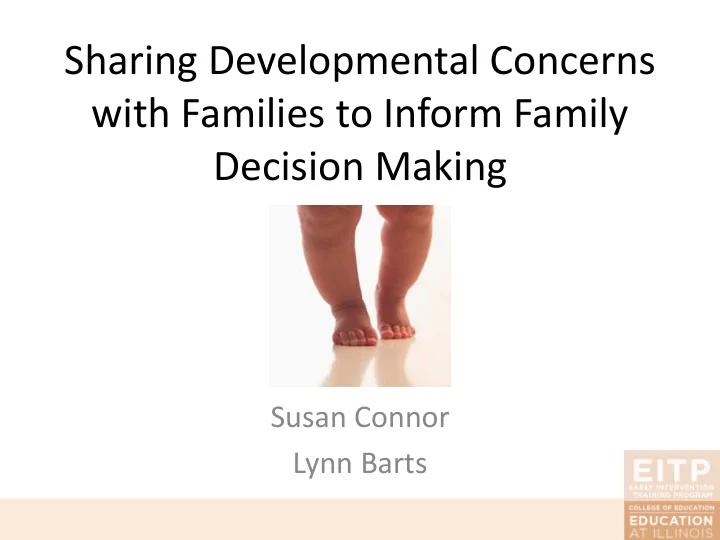

Sharing Developmental Concerns with Families to Inform Family Decision Making Susan Connor Lynn Barts
Agenda Reflecting on Our Experiences Building Relationships with Families Critical Components Look What I Can Do – CHILD FIND Next Steps
Reflecting on Our Experiences Reflect upon a time Reflect upon a time when someone had to when YOU had to share share difficult difficult information with information with you… another person… How did you feel after How did you feel after the conversation? the conversation? What worked in that What worked in that conversation? conversation? What could have worked What could have worked better? better?
Reflective Question How do our experiences impact our behaviors in sharing developmental information with families?
Early Identification Matters Learn the Signs Act Early CDC.gov Families want to know Windows of opportunity Impact of poverty & environmental risks Lack of screenings Relationships are important
The Importance of Child Find The Individuals with Disabilities Education Act (IDEA) Child Find & Mandated Referral Sources The American Academy of Pediatrics (AAP) Medicaid’s Early and Periodic Screening, Diagnosis and Treatment (EPSDT) ExceleRate IL
Communicating Developmental Concerns with Families Critical Components After During Prior to
Setting the Stage for Success Referring for Evaluation Find private space to talk Notice how you are feeling Finding the right time with families confidentially Let families begin by asking Increase your comfort in the family about their Start with Strengths talking with families concerns about their child Discuss influencing factors Provide specific, Don’t take strong emotion such as health, language, non-judgmental examples as a criticism of you or environment of concerns noted Emphasize parents skills Listen to families before and resources to work with giving advice; take their Encourage Hope their child perspective Determine if parents will Provide information about Recognize family diversity contact referral or they referral services and & decisions that may differ prefer you make the options from yours referral.
“We must be able to hear or see or feel that a parent--however he or she is functioning, or however distressed, upset or angry he or she may be--has some investment in the well-being of his or her child” (Pawl, J. 2000)
Referral and Follow Up What’s next?
Illinois Resources In Illinois, the Child Find Project provides free public • Early Intervention awareness services as part of Child & Family the comprehensive Child Find Connections system. • Early Head The goal is to educate the Start/Head Start public about the importance of • School District early services for eligible Early Childhood children as early as possible in Services their development.
https://youtu.be/ELEZiAHswjA
Child & Family Connections Early Intervention Birth to Three Standardized Referral Form REFERRAL FORM https://illinois.edu/blog/files/60 39/114611/4515.pdf The Standardized Referral Form Online Training http://www.illinoiseitraining.org /page.aspx?module=15&type=1 &item=1&eventid=6228 or Resource version at https://illinois.edu/blog/view/60 39/114611#a_toc5
Learn the Signs, Act Early Resources For FREE materials, visit www.cdc.gov/ActEarly or call 1-800-CDC-INFO • http://www.cdc.gov/ncbddd/actearly/index.html Free child development & developmental screening resources • http://www.cdc.gov/ncbddd/watchmetraining/index.html Online Training about sharing developmental concerns • http://www.acf.hhs.gov/programs/ecd/child-health- development/watch-me-thrive Developmental Screening Resource Guides
Walking our Talk… Your Next Steps
Thank you for supporting the children and families of Illinois! Let’s Keep in Touch! Visit our Website eitp.education.illinois.edu F ollow us on Twitter The Early Intervention Training Program at @EITPIllinois the University of Illinois The Children’s Research Center Follow us on Facebook 51 Gerty Drive, Room 105 www.facebook.com/EITPIllinois Champaign, IL 61820
Recommend
More recommend